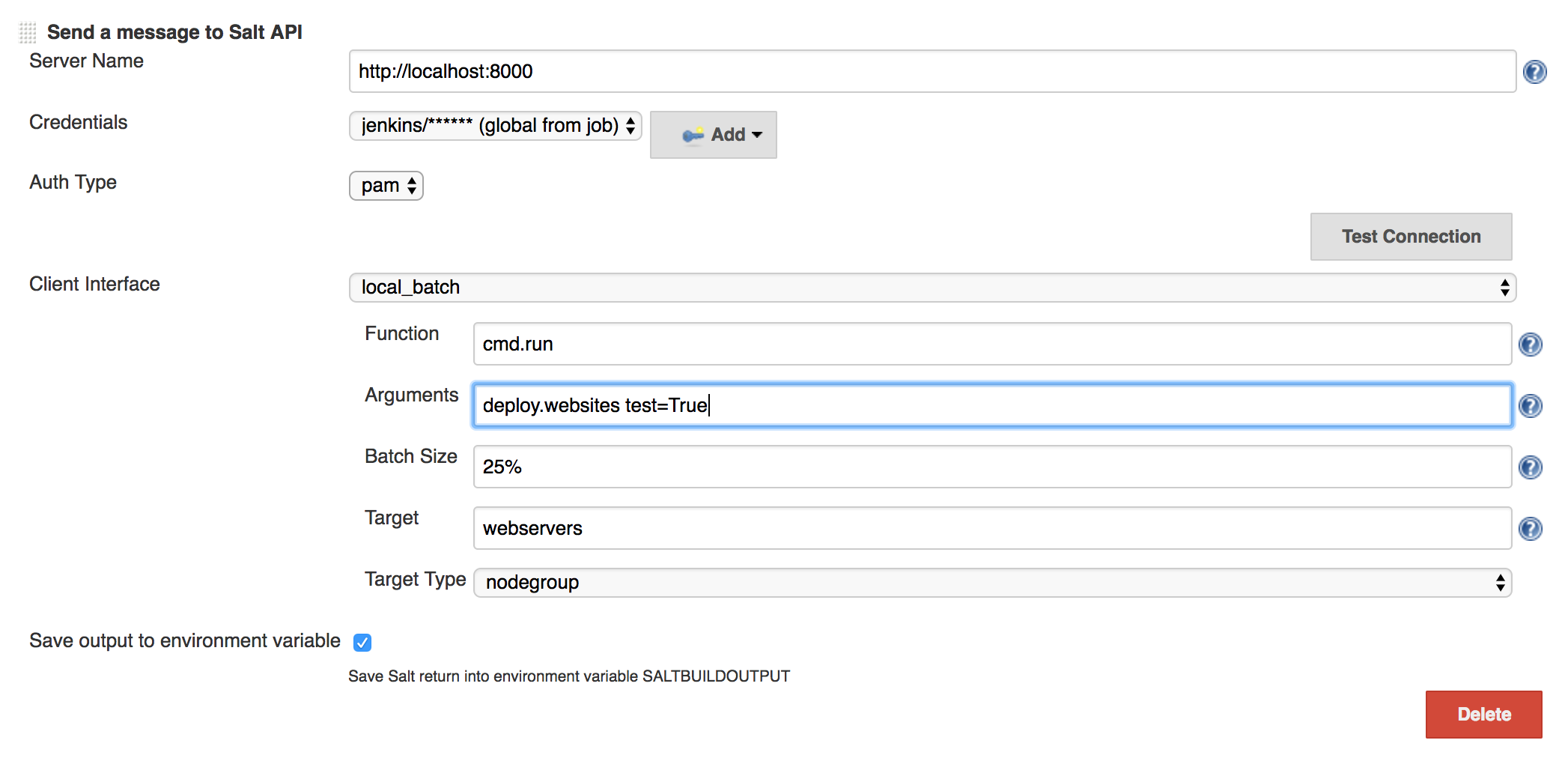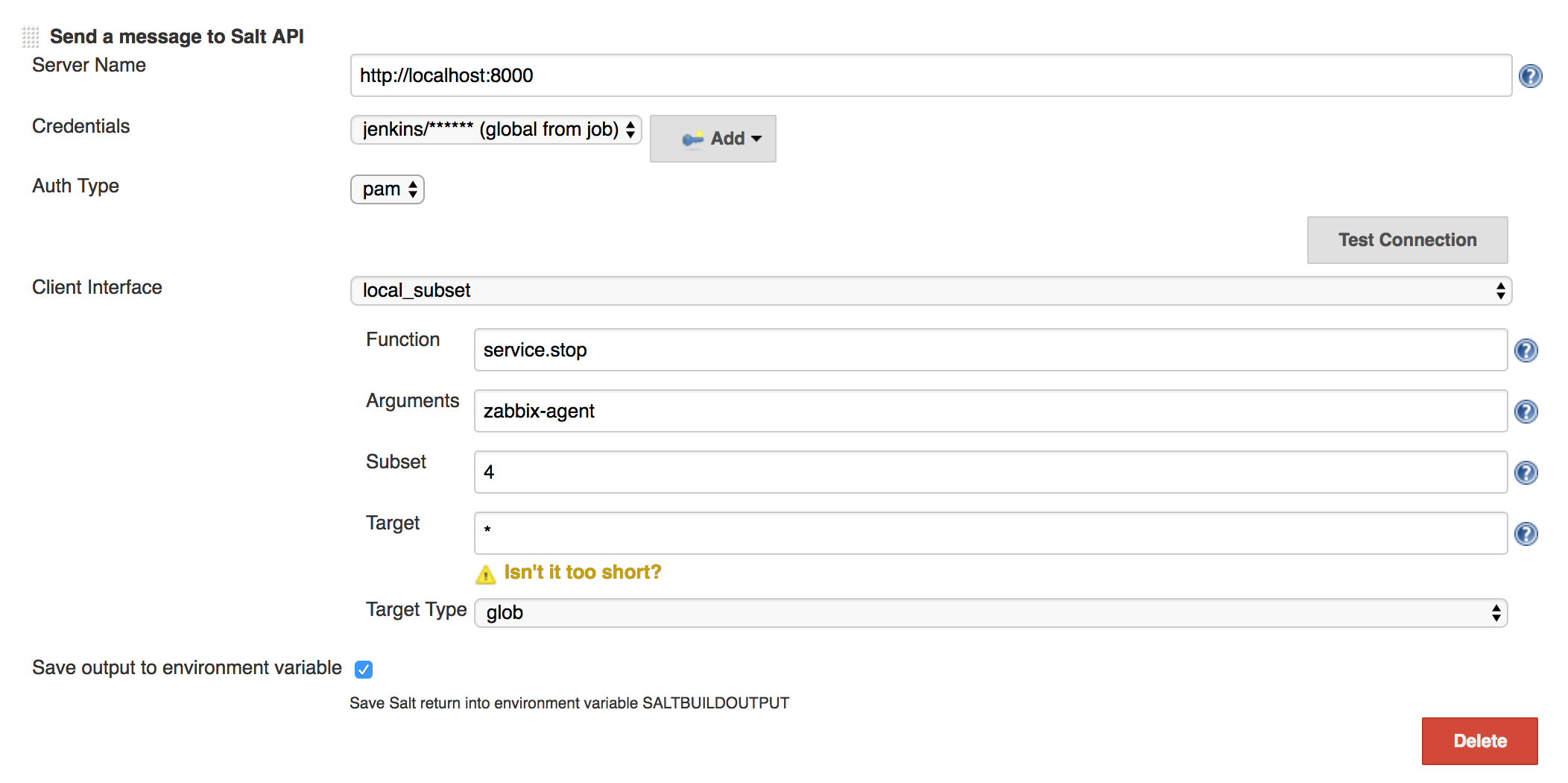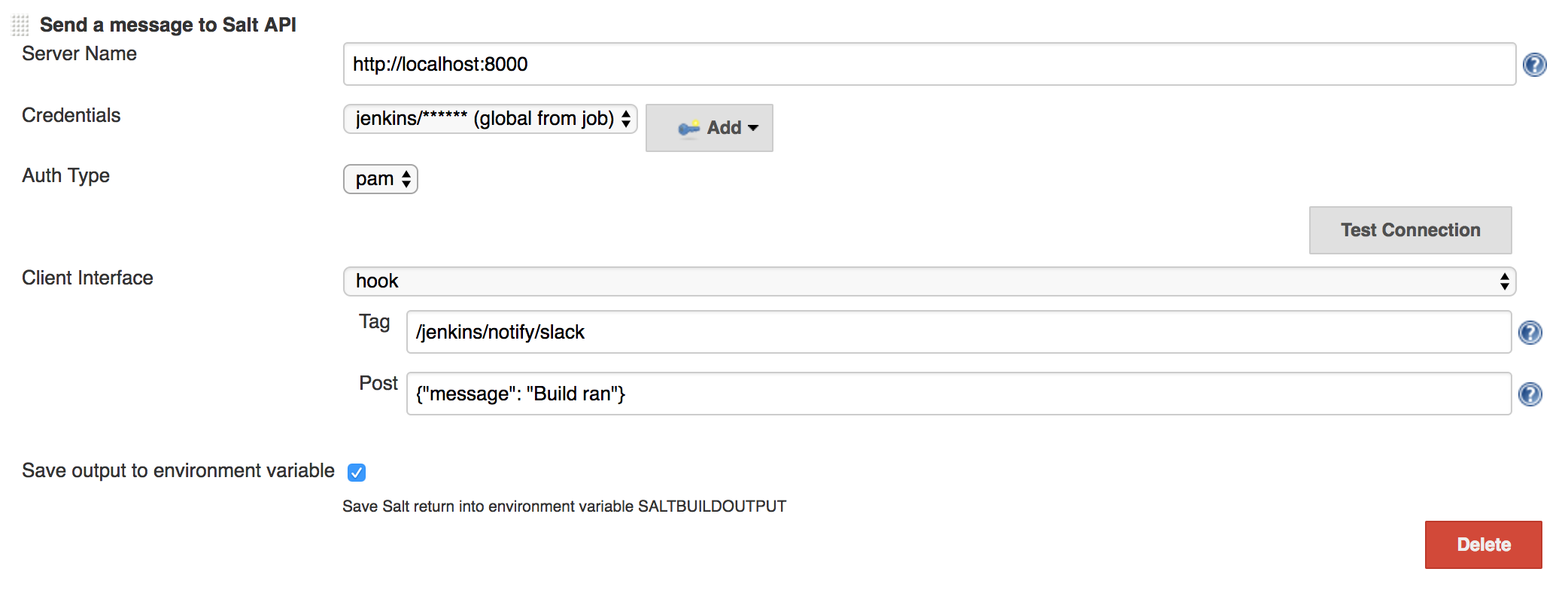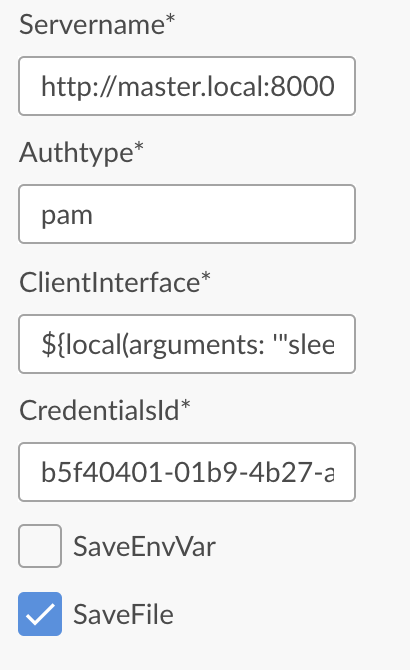This plugin sends a SaltStack API message as a build step
Installing this plugin contributes following:
- Send a message to Salt API - Build step
There are a few options for how to run a salt job:
This is the standard way to run a salt command. If command returns quickly, the results will be returned. Otherwise, if the command is long running, jenkins will not wait. If you wish to have jenkins wait for a long running command to finish, check the "Wait for completion" checkbox.
Salt syntax: "salt -N nodegroup webservers state.sls apache test=True"
Similar to the local operation, but allows for only running the command on a few minions at a time. Jenkins will always wait for all minions to return before finishing, so long running commands will always block the build until finished.
Salt syntax: "salt -b '25%' -N nodegroup webservers state.sls deploy.websites test=True"
Also similar to the local operation, but allows for only running the command on a subset of the target match. Jenkins will always wait for all minions to return before finishing, so long running commands will always block the build until finished.
Salt syntax: salt --subset=4 '*' service.stop zabbix-agent
This allows you to run salt-run commands. It was intended to be used to kick off salt orchestration jobs
Salt syntax: salt-run state.orchestrate orchestration.refresh-apache pillar='{"target":testserver1.domain.com}'
This publishes a message to the salt event bus. Useful for integrating with reactors from Jenkins
Curl syntax: curl -sS localhost:8000/hook/jenkins/notify/slack \
-H 'Content-type: application/json' \
-d '{"message": "Build ran"}'
As of the 2.0 release, Jenkins pipeline is supported
import groovy.json.*
node() {
saltresult = salt authtype: 'pam', clientInterface: local(arguments: '"ls -la"', blockbuild: true,
function: 'cmd.run', jobPollTime: 16, target: '*', targettype: 'glob'),
credentialsId: 'a3d814c2-84ed-4752-94a8-271791bb5375', servername: 'http://localhost:8000'
def prettyJson = JsonOutput.prettyPrint(saltresult)
println(prettyJson)
}
Declarative pipelines are supported and function with the blueocean pipeline editor. As of blueocean 1.3 the pipeline editor does not fully render the input fields and requires some adjustments.
| Servername | http://master.local:8000 |
| Authtype | pam |
| ClientInterface | ${local(arguments: '"sleep 3; ls -la"', blockbuild: true, function: 'cmd.run', jobPollTime: 6, target: '\*', targettype: 'glob')} |
| CredentialsId | b5f40401-01b9-4b27-a4e8-8ae94bc90250 |
| Checkboxes | SaveFile |
env.WORKSPACE = pwd()
def output = readFile "${env.WORKSPACE}/saltOutput.json"
echo output
All together this will create a declarative pipeline Jenkinsfile that looks something like:
JenkinsFile
pipeline {
agent {
node {
label 'agent1'
}
}
stages {
stage('saltcommand') {
steps {
salt(authtype: 'pam', clientInterface: local(arguments: '"sleep 3; ls -la"', blockbuild: true, function: 'cmd.run', jobPollTime: 6, target: '*', targettype: 'glob'), credentialsId: 'b5f40401-01b9-4b27-a4e8-8ae94bc90250', saveFile: true, servername: 'http://master.local:8000')
script {
env.WORKSPACE = pwd()
def output = readFile "${env.WORKSPACE}/saltOutput.json"
echo output
}
}
}
}
}
Simply fill out the connection details on the build page.
If using the wait for long commands to finish option, then you may want to adjust either the poll interval or the minion timeout. The default for both options are set on in the Jenkins configuration page or the default can be overwritten from on the individual job.
- poll interval - controls how often jenkins will check in with the saltapi during a long running job. This can be set to something short (like 5 seconds) if you have a job that completes somewhat quickly. If you have a job that you know will run for an hour, checking every 5 seconds is a bit too frequent.
- minion timeout - If you have a job that should be run on multiple minions but only some minions return, the minion timeout will set how long to wait for the remaining minions to come back before assuming them offline and marking the build as a failure. This is helpful as without the timeout, the jenkins salt plugin will wait forever for the possibly non-existent minions to return.
Allow the user accessing the salt api to have permission to the necessary salt modules. Also grant access for the @runner returner.
external_auth:
pam:
jenkins:
- test.*
- pkg.*
- cmd.*
- state.*
- '@runner'
This jenkins module was written to use SaltStack's cherrypy api and tornado (as of 3.0.0). You will need to add something like the following to your salt master's configuration
rest_cherrypy:
port: 8000
ssl_crt: /etc/pki/tls/certs/localhost.crt
ssl_key: /etc/pki/tls/certs/localhost.key
expire_responses: False
rest_timeout: 7200
Note: some long running jobs may require increasing the rest_timeout or setting the expire_responses options.
You can test if you can access the API with the following command (changing the user and password to the right values).
$ curl -sSk https://<salt-master>:8000/login \
-H 'Accept: application/x-yaml' \
-d username=jenkins \
-d password=jenkins \
-d eauth=pam
Which would give you something similar to the following output.
return:
- eauth: pam
expire: 1458563520.558709
perms:
- .*
- test.*
- pkg.*
- cmd.*
- state.*
- '@runner'
start: 1458520320.558709
token: 634c66d581806e5e9dacefbdc721cba45b78f63c
user: jenkins
To see what is sent/received from the salt-api create a jenkins logger:
Name: salt logs
Logger: com.waytta.saltstack
Log level: ALL
To see what http requests are being sent:
Name: http
Logger: sun.net.www.protocol.http.HttpURLConnection
log level: ALL
To get any output from http, you may also need to add a default FINEST Jenkins logger on /jenkins/log/levels
- For versions 3.2.1 and older, see the Wiki page








